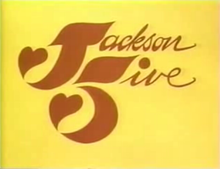The Flintstones is an American animated sitcom produced by Hanna-Barbera Productions, which takes place in a romanticized Stone Age setting and follows the titular family, the Flintstones, and their next-door neighbors, the Rubbles. It was originally broadcast on ABC from September 30, 1960, to April 1, 1966, and was the first animated series with a prime-time slot on television.

Hanna-Barbera was an American animation studio and production company, active from 1957 until it was absorbed into Warner Bros. Animation in 2001. It was founded on July 7, 1957, by William Hanna and Joseph Barbera following Metro-Goldwyn-Mayer's decision to close its in-house cartoon studio, and was formerly headquartered on Cahuenga Blvd from 1960 until 1998 and at the Sherman Oaks Galleria in Sherman Oaks, both in Los Angeles, California.
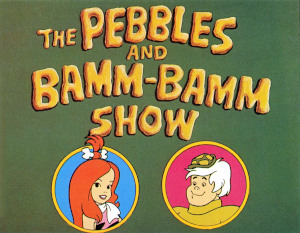
The Pebbles and Bamm-Bamm Show is an American animated television series produced by Hanna-Barbera Productions that originally aired for one season on CBS Saturday morning from September 11, 1971, to January 1, 1972. With an ensemble voice cast of Sally Struthers, Jay North, Mitzi McCall, Gay Hartwig, Carl Esser and Lennie Weinrib, the show follows teenage Pebbles Flintstone and Bamm-Bamm Rubble as they encounter problems growing up in the fictional town of Bedrock. The Pebbles and Bamm-Bamm Show is the first spin-off series of The Flintstones. For the 1972–73 season, the show was revamped as The Flintstone Comedy Hour, with more time given to the original Flintstones cast alongside both reruns and newly produced segments of Pebbles and Bamm-Bamm.
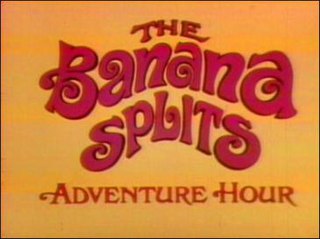
The Banana Splits is an American television variety show produced by Hanna-Barbera Productions and featuring the Banana Splits, a fictional rock band composed of four costumed animal characters in red marching band hats with yellow plumes. The costumed hosts of the show are Fleegle, Bingo, Drooper, and Snorky.

A laugh track is an audio recording consisting of laughter usually used as a separate soundtrack for comedy productions. The laugh track may contain live audience reactions or artificial laughter made to be inserted into the show, or a combination of the two. The use of canned laughter to "sweeten" the laugh track was pioneered by American sound engineer Charles "Charley" Douglass.

Johnny Bravo is an American animated comedy television series created by Van Partible for Cartoon Network and distributed by Warner Bros. Domestic Television Distribution. It is the second of the network's Cartoon Cartoons, which aired from July 14, 1997, to August 27, 2004. The titular Johnny Bravo, who is loosely based on Elvis Presley and James Dean, is a sunglasses-wearing, muscular young man who lives with his mother and attempts to get women to date him, though he always falls short because of his actions. He ends up in bizarre situations and predicaments, often accompanied by celebrity guest characters such as Donny Osmond or Adam West. Throughout its run, the show was known for its adult humor and pop culture references.

Josie and the Pussycats is an American animated television series based upon the Archie Comics comic book series of the same name created by Dan DeCarlo. Produced for Saturday morning television by Hanna-Barbera Productions, 16 episodes of Josie and the Pussycats aired on CBS during the 1970–71 television season and were rerun during the 1971–72 season.
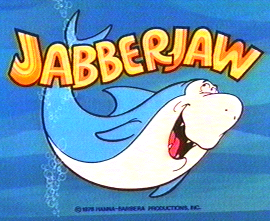
Jabberjaw is an American animated television series created by Joe Ruby and Ken Spears and produced by Hanna-Barbera which aired 16 original episodes on ABC from September 11 to December 18, 1976. Reruns continued on ABC until September 3, 1978.
Saturday TV Funhouse is a segment on NBC's Saturday Night Live featuring cartoons created by SNL writer Robert Smigel. 101 "TV Funhouse" segments aired on SNL between 1996 and 2008, with one further segment airing in 2011. It also spawned a short-lived spinoff series, TV Funhouse, that aired on Comedy Central.
Where's Huddles? is an American animated sitcom produced by Hanna-Barbera Productions that premiered on CBS on July 1, 1970. It ran for ten episodes as a summer replacement show for Hee Haw, until September 2.
Wait Till Your Father Gets Home is an animated sitcom produced by Hanna-Barbera Productions that aired in first-run syndication in the United States from 1972 to 1974. The show originated as a one-time segment on Love, American Style called "Love and the Old-Fashioned Father". The same pilot was later produced with a live cast, but with no success. The show was the first primetime animated sitcom to run for more than a single season since fellow Hanna-Barbera show The Flintstones more than ten years earlier, and would be the only one until The Simpsons seventeen years later. The show was inspired by All in the Family.

Goober and the Ghost Chasers is an animated television series produced by Hanna-Barbera Productions, broadcast on ABC from September 8 to December 22, 1973. A total of 16 half-hour episodes of Goober and the Ghost Chasers were produced. It was later serialized as part of the syndicated weekday series Fred Flintstone and Friends during 1977–78. On cable, it was shown as part of USA Cartoon Express and on Boomerang starting in 2000.

Wheelie and the Chopper Bunch is an American animated television series, produced by Hanna-Barbera, which originally aired for one season on NBC from September 7 to November 30, 1974. The show aired for 13 half-hour episodes.

Harlem Globetrotters is a Saturday morning cartoon produced by Hanna-Barbera and CBS Productions, featuring animated versions of players from the basketball team of the same name.
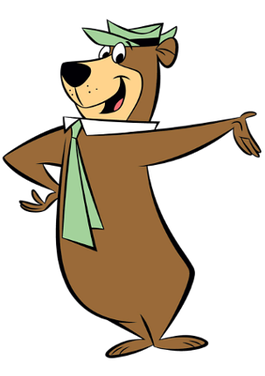
Yogi Bear is an anthropomorphic animal character who has appeared in numerous comic books, animated television shows, and films. He made his debut in 1958 as a supporting character in The Huckleberry Hound Show.

de Passe Jones Entertainment (dJE) is an American entertainment content provider led by Suzanne de Passe and Madison Jones that sources, develops, acquires, and produces a variety of television, motion picture, theater, new media, and print content. The company was founded by Berry Gordy Jr., in 1968, as Motown Productions, the film and television arm of Gordy's Motown Records label. It became de Passe Entertainment in 1992, then in 2008, joining forces with Jones, de Passe Jones Entertainment.

The Flintstone Comedy Hour is an American animated television series and a spin-off of The Flintstones and The Pebbles and Bamm-Bamm Show, produced by Hanna-Barbera, which aired on CBS from September 9, 1972, to September 1, 1973. It was re-titled The Flintstone Comedy Show for a second season of reruns as a half-hour show from September 8, 1973, to January 26, 1974.

The Osmonds is a 1972 ABC-TV Saturday morning cartoon series produced by Rankin/Bass Productions starring the Osmond Brothers. Each episode features the family in a different location around the world, with young Jimmy's antics usually driving the plot of the episode. As with most television series oriented around bands, the Osmonds' songs were featured prominently in the series. The series also featured their talking pet dog, Fuji. Marie Osmond did not appear in the series as she would not make her performing debut until 1973. An abridged version of their hit song "One Bad Apple" was used for the opening and closing credits of the show.
Jokebook is an American adult animated comedy series produced by Hanna-Barbera. It aired on NBC for three episodes from April 23 to May 7, 1982.
